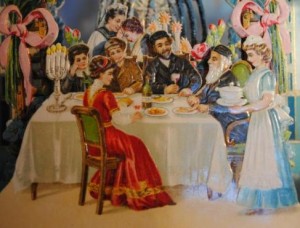Happy Hanukkah to all our Jewish friends!
The nineteenth-century saw some lasting changes in how this ancient religious festival is celebrated. Here's a fascinating article about ways Hanukkah celebrations, like Christmas celebrations, spread out from the strictly religious arena and entered popular culture:
http://carlanthonyonline.com/2013/12/19/american-hanukkah-how-pop-culture-created-jewish-christmas/
***
People interested in learning more about Jewish culture in the late Victorian era might find this archive useful:
http://quod.lib.umich.edu/a/amjewess/browseissue.html
This is a collection of digitized pieces from The American Jewess.
Here's a description of the magazine from elsewhere on the website:
"Published between April 1895 and August 1899, The American Jewess was the first English-language publication directed to American Jewish women. Part of the emergence of new public identities for Jewish women, The American Jewess offered an evocative range of features that included demands for synagogue membership for women; health, household and fashion tips; early expressions of American Zionism; short fiction....
The American Jewess represented the changing aspirations of America's prosperous and acculturated Jewish women. The magazine's title reflected an emerging belief that this group constituted a new entity in Jewish life: women who did not experience the religious and national aspects of their identity as in conflict with each other. Thoroughly American and thoroughly Jewish, the "American Jewess" felt fully at home in her overlapping worlds of American and Jewish culture. The American Jewessmagazine set out to explore the challenges and possibilities inherent in this new identity. At its height, the magazine claimed a circulation of 31,000.
In the first issue of The American Jewess, its editor, Rosa Sonneschein, observed that, "Not what has happened, but what is recorded makes history."
***
For fans of historical fiction, I highly recommend the novel
All Other Nights by Dara Horn
http://www.amazon.com/All-Other-Nights-A-Novel/dp/0393338320_
The book's summary:
How is tonight different from all other nights? For Jacob Rappaport, a Jewish soldier in the Union Army, it is a question his commanders have answered for him: on Passover, 1862, he is ordered to murder his own uncle, who is plotting to assassinate Abraham Lincoln. After this harrowing mission, Jacob is recruited to pursue another enemy agent―this time not to murder the spy, but to marry her. Based on real historical figures, this eagerly awaited novel from award-winning author Dara Horn delivers multilayered, page-turning storytelling at its best.
***
***
The Jewish Connection With Our Name
People are often amused when they hear that I only had to change my family name by one letter when I got married: from Christman (with a "t") to Chrisman (no "t"). The scene at City Hall when I filled out the paperwork for the name change bore a striking resemblance to the old "Who's On First?" skit:
"What are you changing your name to?"
"Chrisman."
"So what are you changing it from?"
"Christman."
"Wait a minute, so what are you changing it to?"
"Chrisman!"
"So you're not changing it?"
We went back and forth on this for a while before the confused civil servant finally put the paperwork through.
My name was so similar to Gabriel's because our ancestors went through similar experiences at different points in history: We're both descended from Ashkenazic Jewish families who converted to Christianity to avoid persecution. Our ancestors changed their original family names to make the conversion really obvious. ("No, no Jews here! Us? We're Christians! See, Christ Man! What could be more Christian than that! Um, please put the torch and the pitchfork away now, you're making me nervous...")
The Chrismans (Gabriel's family) were Alsatian Jews who made the change during the Reformation. At a time when Christians looked at other Christians and saw differences they considered big enough to justify assault, defenestration, and mass killings, some Jewish families decided that discretion was the better part of valor and, as in the case of Gabriel's ancestors, converted.
My own ancestors held out a little longer. Living in the Black Forest in what is now southern Germany, they managed to lie low during the Reformation, but eventually succumbed to very legitimate fear during the Napoleonic Wars. During the political turmoil of that time, many individuals took advantage of the chaos at large to act on anti-Semitic sentiments which had been held in check by law when society was stable. To survive, my ancestors converted and changed their name to Christmann; the second "n" was dropped a couple generations later by their grandchildren who came to America in the 1860s. (Incidentally, that first generation of American Christmans fought for the Union in the Civil War.)
It's a pity that we'll never know what our original family names were. Our ancestors were careful to erase all trace of them: if they hadn't, we might not be here today.
Even though our families haven't been Jewish for a very long time, we like to stop now and then to remember where we came from, and to offer our most profound respect for those who still practice the religion of our ancestors. Happy Hanukkah!

 RSS Feed
RSS Feed